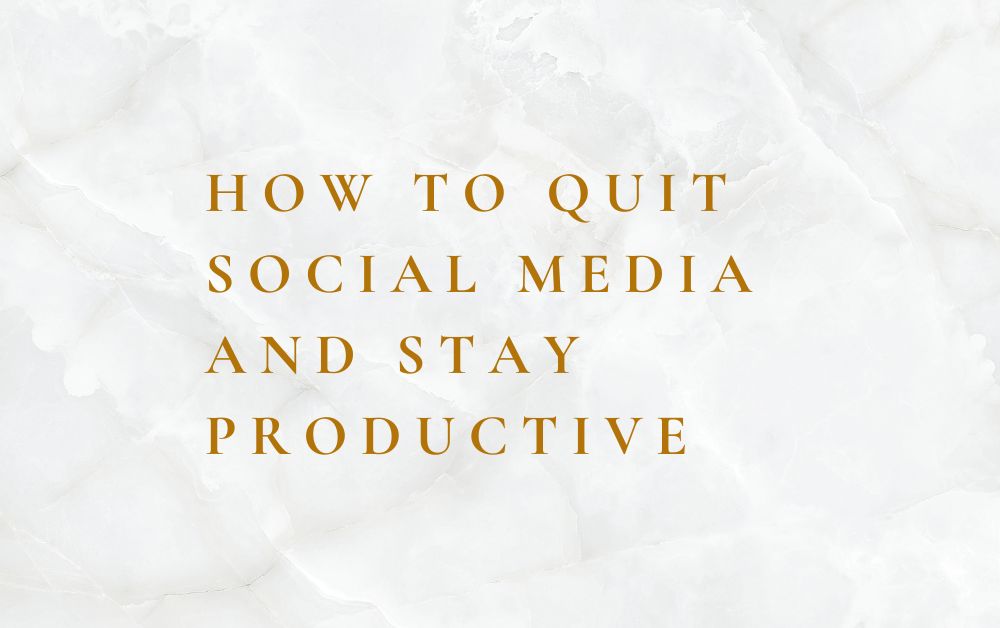Social media has become an integral part of our daily lives. While it offers numerous benefits, such as staying connected with friends and family and accessing real-time information, it can also be a significant distraction. Spending too much time on social media can lead to decreased productivity, increased stress, and even mental health issues. If you find yourself constantly checking your social media accounts and feeling unproductive, it might be time to consider quitting or significantly reducing your usage. In this comprehensive guide, we will discuss practical steps on how to quit social media and stay productive.
Understanding the Impact of Social Media
The Distraction Factor
Social media platforms are designed to be engaging. Notifications, likes, comments, and endless scrolling can easily capture your attention, making it difficult to focus on more important tasks. This constant distraction can lead to procrastination and lower productivity.
Note – Ready to reclaim your time and boost your productivity? Take the first step towards a healthier, more focused life by quitting social media. Start by setting clear goals, creating a plan, and finding fulfilling activities to replace your screen time. Share your journey with us and inspire others to do the same. Quit social media today and unlock your true potential!
Mental Health Concerns
Excessive use of social media has been linked to various mental health issues, including anxiety, depression, and low self-esteem. Comparing yourself to others and feeling the need to present a perfect life online can contribute to these negative feelings.
Sleep Disruption
Using social media, especially before bedtime, can interfere with your sleep patterns. The blue light emitted by screens can disrupt your body’s natural sleep-wake cycle, making it harder to fall asleep and get restful sleep.
Assessing Your Social Media Usage
Track Your Time
The first step in reducing your social media usage is to understand how much time you are spending on these platforms. Use built-in tools on your smartphone or third-party apps to track your screen time. This will give you a clear picture of your social media habits.
Identify Triggers
Pay attention to what triggers you to check social media. Is it boredom, stress, or habit? Understanding your triggers can help you develop strategies to address them without turning to social media.
Evaluate the Benefits
Consider the benefits you gain from social media and weigh them against the negative impacts. This can help you decide whether quitting social media is the right choice for you or if you need to set healthier boundaries.
Steps to Quit Social Media
Set Clear Goals
Determine why you want to quit social media and what you hope to achieve. Having clear goals will keep you motivated throughout the process.
Example Goals
- Increase Productivity: Spend more time on work, hobbies, or personal development.
- Improve Mental Health: Reduce anxiety and stress levels.
- Enhance Relationships: Focus on in-person interactions and meaningful connections.
Create a Plan
Develop a step-by-step plan to reduce your social media usage gradually. Quitting cold turkey can be challenging and may lead to relapse. A gradual approach can make the transition smoother.
Steps to Reduce Usage
- Set Time Limits: Use app timers to restrict your daily social media usage.
- Remove Notifications: Turn off notifications to reduce distractions.
- Designate Social Media-Free Times: Set specific times during the day when you will not use social media, such as during meals or before bedtime.
- Delete Apps: Remove social media apps from your phone to reduce easy access.
Find Alternatives
Identify activities that can replace your social media usage. Finding productive and enjoyable alternatives can help you stay off social media.
Alternative Activities
- Reading: Dive into books, articles, or blogs that interest you.
- Exercise: Engage in physical activities like walking, jogging, or yoga.
- Hobbies: Pursue hobbies such as painting, cooking, or playing an instrument.
- Social Interactions: Spend time with friends and family in person.
Stay Accountable
Share your goals with friends or family members who can support you in your journey. Accountability can help you stay committed to your plan.
Accountability Tips
- Buddy System: Find a friend who also wants to reduce their social media usage and support each other.
- Regular Check-Ins: Set up regular check-ins with a trusted person to discuss your progress and challenges.
- Join a Group: Participate in online or offline groups focused on reducing social media usage.
Maintaining Productivity Without Social Media
Establish a Routine
Creating a daily routine can help you stay focused and productive. A structured schedule reduces the chances of falling back into old habits.
Routine Tips
- Morning Routine: Start your day with activities that set a positive tone, such as exercise, meditation, or reading.
- Work Blocks: Break your workday into focused blocks of time with short breaks in between.
- Evening Routine: Wind down with relaxing activities that do not involve screens, such as reading or spending time with loved ones.
Set Clear Priorities
Identify your most important tasks and focus on them first. Prioritizing your tasks ensures that you spend your time on activities that matter most.
Priority Tips
- Daily To-Do List: Write down your top priorities for the day and tackle them in order of importance.
- Avoid Multitasking: Focus on one task at a time to improve the quality of your work and increase efficiency.
- Review and Adjust: At the end of each day, review your accomplishments and adjust your priorities for the next day.
Use Productivity Tools
Several tools and apps can help you stay organized and productive. Explore different options to find the ones that work best for you.
Productivity Tools
- Task Managers: Apps like Todoist, Trello, or Asana help you manage your tasks and projects.
- Time Trackers: Tools like Toggl or Clockify allow you to track the time spent on different activities.
- Focus Apps: Apps like Focus@Will or Forest help you stay focused by minimizing distractions.
Take Regular Breaks
Taking regular breaks is essential for maintaining productivity. Short breaks help you recharge and prevent burnout.
Break Tips
- Pomodoro Technique: Work for 25 minutes and take a 5-minute break. Repeat this cycle four times, then take a longer break.
- Stretching: Use breaks to stretch your body and relieve tension.
- Mindfulness: Practice mindfulness or meditation during breaks to clear your mind and reduce stress.
Dealing with Social Media Withdrawal
Acknowledge Your Feelings
Quitting social media can lead to feelings of withdrawal, such as boredom, anxiety, or a fear of missing out (FOMO). Acknowledge these feelings and understand that they are normal.
Stay Positive
Focus on the positive changes you are experiencing, such as increased productivity, better sleep, and improved mental health. Keeping a positive mindset can help you stay motivated.
Seek Support
If you are struggling, do not hesitate to seek support from friends, family, or a professional. Talking about your experiences can provide relief and encouragement.
Reintroducing Social Media in a Healthy Way
Set Boundaries
If you decide to reintroduce social media into your life, set clear boundaries to prevent falling back into old habits.
Boundary Tips
- Limit Usage: Set specific times for social media usage and stick to them.
- Purposeful Use: Use social media for specific purposes, such as staying connected with loved ones or accessing important information.
- Unfollow and Filter: Unfollow accounts that do not add value to your life and filter your feed to see only the content that matters to you.
Practice Mindfulness
Be mindful of how social media affects your mood and behavior. Regularly assess your usage and make adjustments as needed.
Mindfulness Tips
- Self-Reflection: Take time to reflect on how social media makes you feel and whether it aligns with your goals.
- Digital Detox: Periodically take breaks from social media to reset your habits and priorities.
- Healthy Habits: Incorporate healthy digital habits, such as not using social media before bed and being present during in-person interactions.
Conclusion
Quitting or reducing social media usage can significantly improve your productivity, mental health, and overall well-being. By understanding the impact of social media, setting clear goals, creating a plan, and finding healthy alternatives, you can successfully reduce your reliance on social media. Remember to stay accountable, establish a routine, and use productivity tools to maintain your focus. If you decide to reintroduce social media, set boundaries and practice mindfulness to ensure a healthy balance. Taking these steps can help you lead a more productive and fulfilling life.
For more insightful articles related to this topic, feel free to visit theguestbloggers




